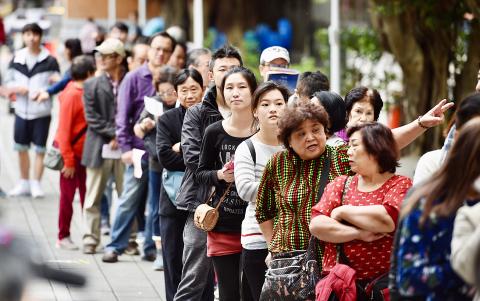Taiwanese voted in 10 referendums alongside yesterday’s nine-in-one local elections — the greatest number of referendums held simultaneously since the plebiscite mechanism was implemented in 2004.
The referendums covered a broad range of issues, including the definition of marriage in the Civil Code, the ban on food imports from five Japanese prefectures imposed after the Fukushima Dai-ichi nuclear power plant disaster in 2011 and changing the national team’s name from “Chinese Taipei” to “Taiwan” for the 2020 Tokyo Olympic Games.
A total of 19,757,067 people were eligible to vote on yesterday’s referendums, the Central Election Commission (CEC) said.

Photo: Liao Chen-huei, Taipei Times
Amendments to the Referendum Act (公民投票法) in December last year lowered the threshold needed to pass a referendum.
Yesterday, at least one-quarter of the eligible voters — or 4,939,267 votes — needed to be in favor of a referendum, with the “yes” votes outnumbering the “no” votes, for a referendum to pass.
Results of the 10 referendums were not available at press time last night.
The CEC on Friday said it hoped to finish counting all the referendum ballots by midnight yesterday, meaning that the results could be announced by 2am today.
By law, referendum results must be made public within seven days, CEC Vice Chairman Chen Chao-chien (陳朝建) said.
Under the Referendum Act, a law repealed in a referendum would be rescinded three days after the result is officially announced by the commission, Chen said.
A result that calls for new legislation would require the government to submit a proposed bill no later than three months after the vote and the Legislative Yuan to complete a review before the next summer or winter break, the act says.
A result that calls for a change in policy would require the president or relevant authority to take steps to implement the change, the act says.
The referendum sponsor can apply to the Council of Grand Justices for an interpretation if they feel that the authorities have not handled the matter properly, Chen added.
A referendum that does not pass is not legally binding and no referendum can be launched on the same topic for two years, Chen said.
Prior to yesterday’s vote, the CEC made public the Executive Yuan’s opinions regarding the 10 referendums.
The Executive Yuan maintains that if the referendum passes, the government should respect the results calling for the name of the national team participating in the 2020 Tokyo Olympic Games to be changed from “Chinese Taipei” to “Taiwan.”
If the referendum passes, the Chinese Taipei Olympic Committee would be tasked with filing applications with the International Olympic Committee, moving forward on the assumption that the nation’s Olympic membership remains valid and that Taiwanese athletes can still represent Taiwan at the Games, the Executive Yuan said.
The Executive Yuan maintains that enough thermal power plants would need to remain operational to ensure stable power output even if the referendum proposed by Chinese Nationalist Party (KMT) Legislator Lu Shiow-yen (盧秀燕) passed.
It called for power output from thermal power plants be lowered by 1 percent annually.

DAREDEVIL: Honnold said it had always been a dream of his to climb Taipei 101, while a Netflix producer said the skyscraper was ‘a real icon of this country’ US climber Alex Honnold yesterday took on Taiwan’s tallest building, becoming the first person to scale Taipei 101 without a rope, harness or safety net. Hundreds of spectators gathered at the base of the 101-story skyscraper to watch Honnold, 40, embark on his daredevil feat, which was also broadcast live on Netflix. Dressed in a red T-shirt and yellow custom-made climbing shoes, Honnold swiftly moved up the southeast face of the glass and steel building. At one point, he stepped onto a platform midway up to wave down at fans and onlookers who were taking photos. People watching from inside

A Vietnamese migrant worker yesterday won NT$12 million (US$379,627) on a Lunar New Year scratch card in Kaohsiung as part of Taiwan Lottery Co’s (台灣彩券) “NT$12 Million Grand Fortune” (1200萬大吉利) game. The man was the first top-prize winner of the new game launched on Jan. 6 to mark the Lunar New Year. Three Vietnamese migrant workers visited a Taiwan Lottery shop on Xinyue Street in Kaohsiung’s Gangshan District (崗山), a store representative said. The player bought multiple tickets and, after winning nothing, held the final lottery ticket in one hand and rubbed the store’s statue of the Maitreya Buddha’s belly with the other,

‘NATO-PLUS’: ‘Our strategic partners in the Indo-Pacific are facing increasing aggression by the Chinese Communist Party,’ US Representative Rob Wittman said The US House of Representatives on Monday released its version of the Consolidated Appropriations Act, which includes US$1.15 billion to support security cooperation with Taiwan. The omnibus act, covering US$1.2 trillion of spending, allocates US$1 billion for the Taiwan Security Cooperation Initiative, as well as US$150 million for the replacement of defense articles and reimbursement of defense services provided to Taiwan. The fund allocations were based on the US National Defense Authorization Act for fiscal 2026 that was passed by the US Congress last month and authorized up to US$1 billion to the US Defense Security Cooperation Agency in support of the

‘COMMITTED TO DETERRENCE’: Washington would stand by its allies, but it can only help as much as countries help themselves, Raymond Greene said The US is committed to deterrence in the first island chain, but it should not bear the burden alone, as “freedom is not free,” American Institute in Taiwan Director Raymond Greene said in a speech at the Institute for National Defense and Security Research’s “Strengthening Resilience: Defense as the Engine of Development” seminar in Taipei yesterday. In the speech, titled “Investing Together and a Secure and Prosperous Future,” Greene highlighted the contributions of US President Donald Trump’s administration to Taiwan’s defense efforts, including the establishment of supply chains for drones and autonomous systems, offers of security assistance and the expansion of